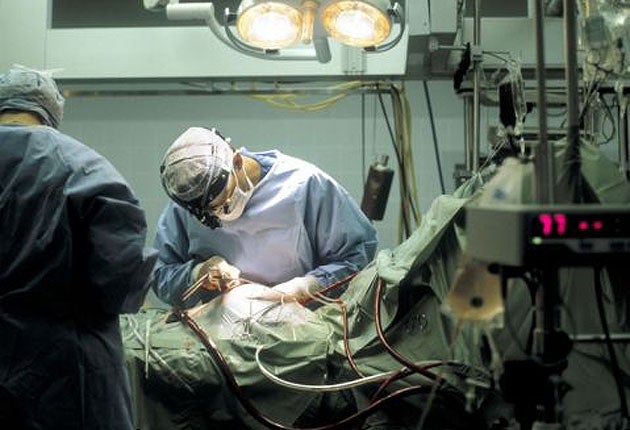Right patient? Right limb? Two questions that have almost halved death rate at one hospital

Surgeons in England and Wales will be ordered today to carry out a safety checklist before every operation they perform, after a study showed it cut surgical deaths and complications by a third.
Described as the biggest clinical innovation in 30 years, the checklist is based on a set of seemingly banal questions but is set to become as essential to daily medicine as the stethoscope. In Britain alone, the new procedure could save hundreds of lives a year and 80,000 complications.
A pilot study run in a London hospital, St Mary's in Paddington, and seven others around the world, has shown that using the checklist cut the death rate following surgery from 1.5 per cent to 0.8 per cent (47 per cent) and the complication rate from 11 per cent to 7 per cent (36 per cent). There was no distinction between hospitals in richer and poorer countries on complications, but richer countries saw a smaller decline in deaths of about a third (though this was not statistically significant).
With an estimated 234 million operations performed yearly around the world, and eight million in Britain – one for every eight people in the population – that translates to millions of lives saved.
The results of the study, organised by the World Health Organisation (WHO), are published in the New England Journal of Medicine. Surgeons and nurses run through a series of basic safety checks before each operation, similar to those made by pilots before take-off. The checks include asking: Is this the right patient? Is this the right limb? Has the patient had the right drugs?
Britain's National Patient Safety Agency (NPSA) issued an alert today to all hospitals and clinics where surgery is performed, setting a deadline for implementation of the checklist by February 2010. Kevin Cleary, the medical director of the NPSA, said: "It is very difficult for the general public to believe that these checks are not being made already. It is about making them every time, and not assuming that someone else is making them."
The latest figures for Britain show that there were 129,419 surgical incidents in 2007 when patients were put at risk, more than 1,000 of which resulted in severe harm and 271 in death. One patient a day was listed for the wrong operation. Sir Liam Donaldson, the Government's chief medical officer, highlighted in his annual report last year 14 cases in which patients undergoing brain surgery had had burr holes drilled on the wrong side of the head. More than one operation a month was carried out on the wrong site in 2007.
Lord Darzi, a Health minister and surgeon at St Mary's who chaired the WHO group that devised the 19-item checklist, said that its implementation across the country was "a dream come true". He added: "It was in front of us – we all travel and it is in every [aircraft] cockpit. Surgery has become vastly more complex and susceptible to errors. Having a system that reminds the whole team of the 19 items is essential. No single individual, however bright, could ensure it happens every time."
About 20,000 patients die each year following surgery, but it is not known how many are preventable. An estimated 2,000 patients die as a result of errors following all forms of treatment and an inquiry by the National Audit Office in 2005 concluded that half could have been avoided if staff had learnt the lessons of previous incidents.
Atul Gawande, an American surgeon and associate professor at the Harvard School of Public Health, who led the study, said work was under way on further checklists for maternity and childbirth (to be published this year), heart disease, pneumonia, HIV and mental health. "It is one of those simple, unbelievably powerful ideas that will have an impact across medicine. Surgeons had assumed that doing well for patients was mostly about their skill. But there is now too much technology and too many patients for one person to deal with."
He added: "When I talk to clinicians, they say: 'we already do this stuff.' The answer is: we are good at doing it most of the time, but we are not good at doing it all the time. We found some members of the team felt they were such low agents, they only felt responsible for their corner. Being allowed to say who they were [one item on the checklist] and hear the surgeon say what he expected made them feel part of the team. When you are not given a voice you turn your brain off."
Peter Walsh, chief executive of the charity Action against Medical Accidents, said there was concern about how surgeons would react to the checklist. "People are on tenterhooks. Some surgeons say that checklists de-professionalise them, turning them into automatons who don't think. But it is only a tool. It has to be used with professional judgement," he argued.
Donald Berwick, the president of the US Institute for Healthcare Improvement, said of the innovation: "I cannot recall a clinical care innovation in the past 30 years that has shown results of the magnitude demonstrated by the surgical checklist."
Join our commenting forum
Join thought-provoking conversations, follow other Independent readers and see their replies
Comments